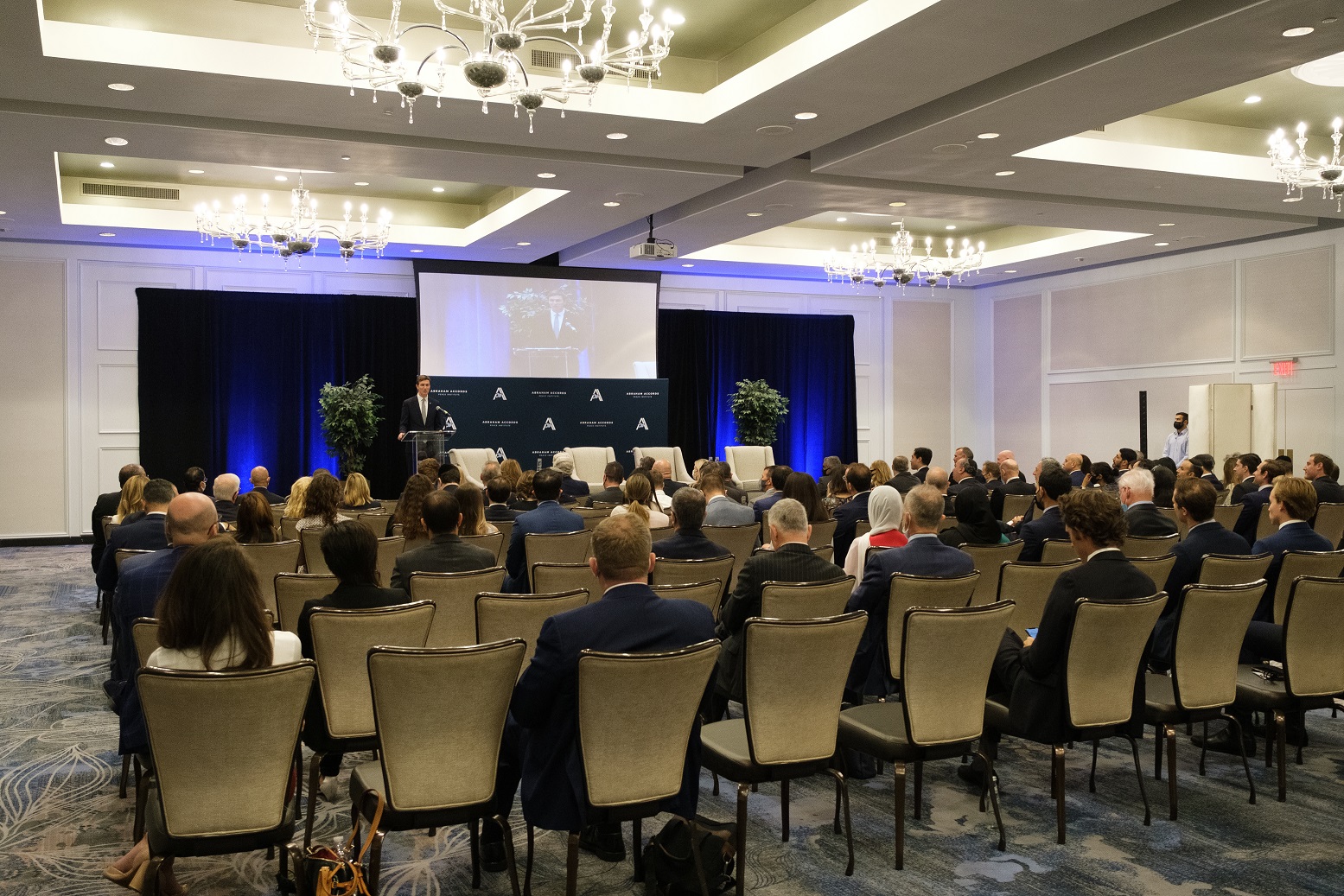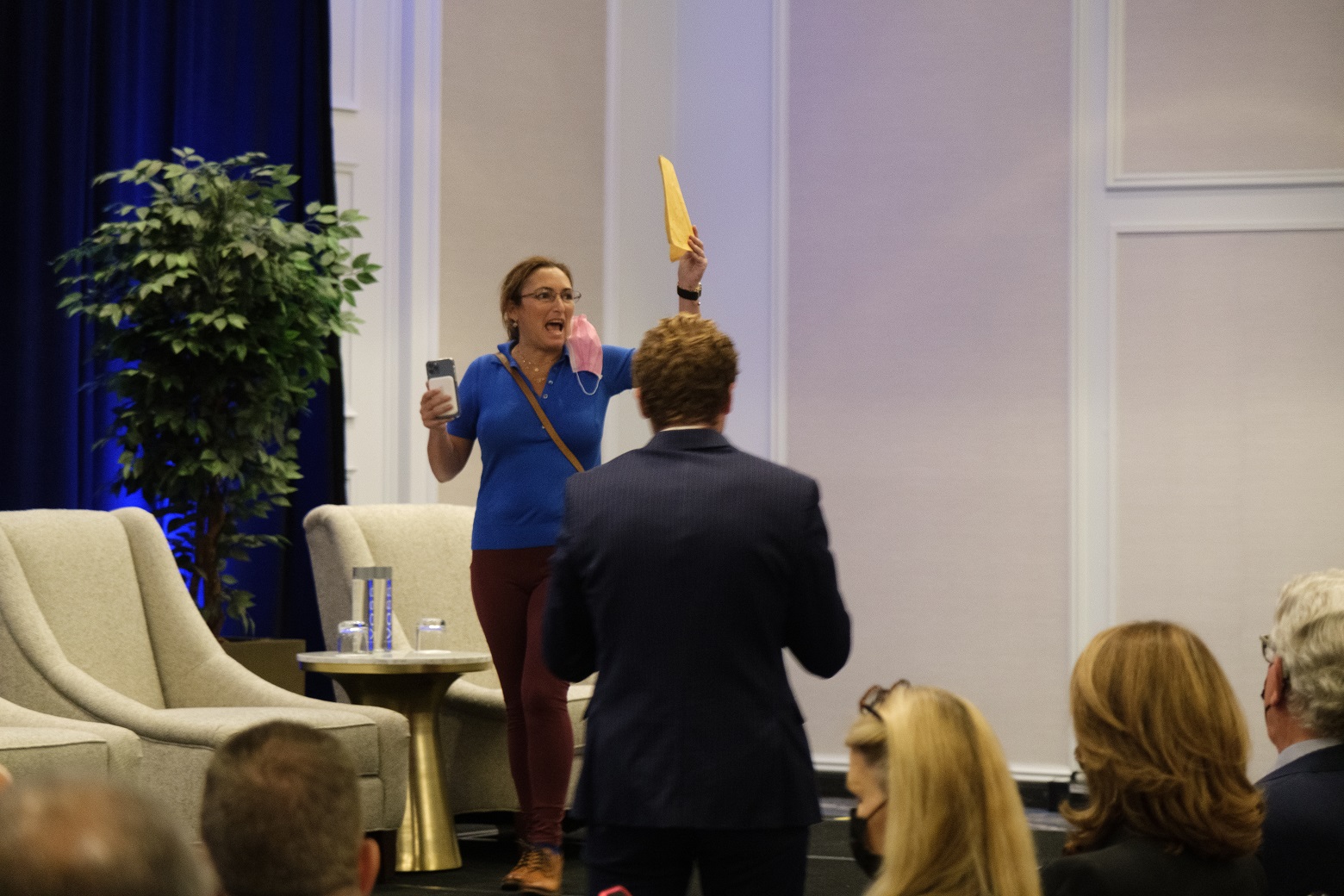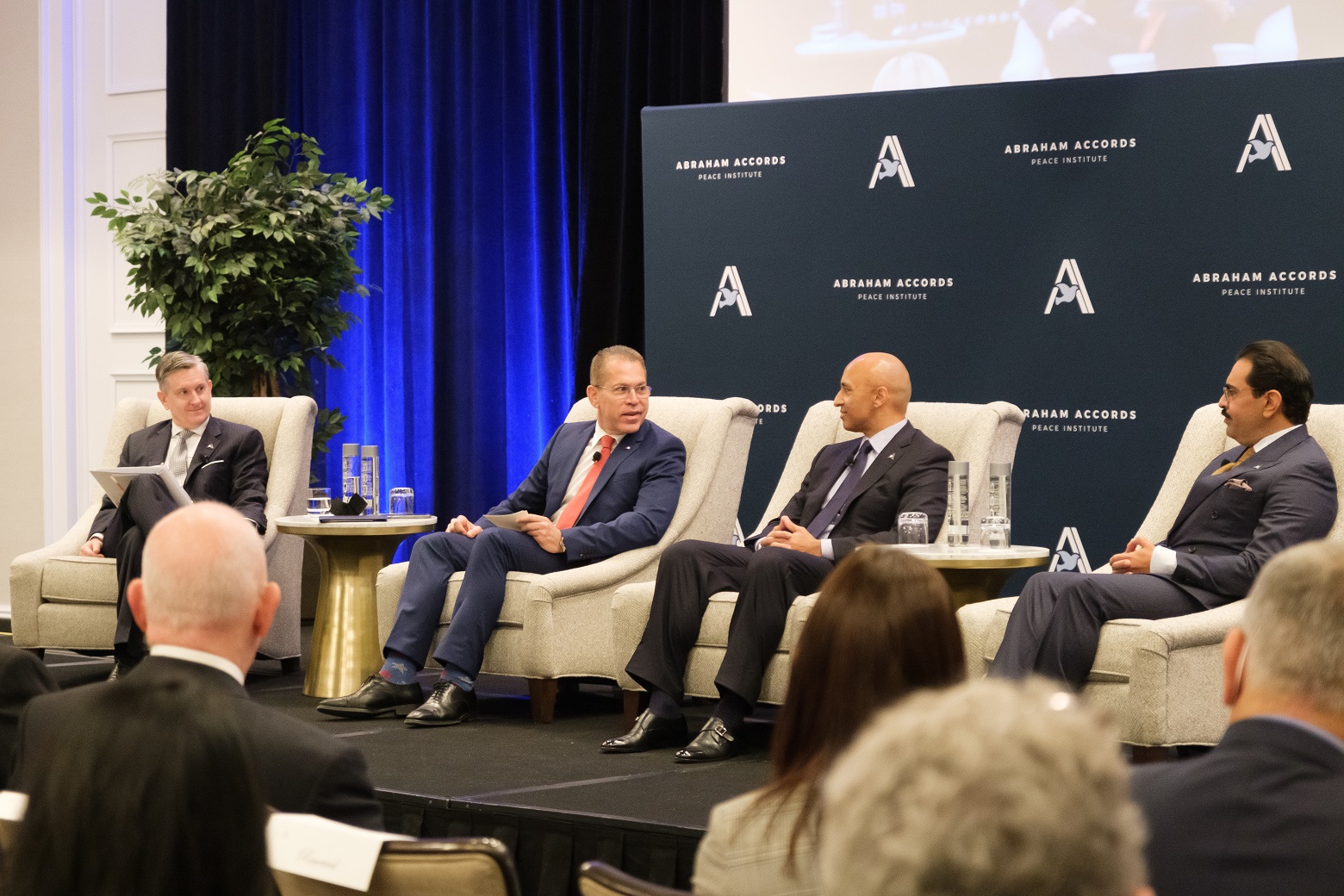(September 17, 2021 / JNS) Demonstrating their friendship and willingness to continue working together in their region, the ambassadors from Israel, the United Arab Emirates and Bahrain sat for a panel discussion on Sept. 14, one day before the first-year anniversary of the Abraham Accords and brought together by the newly established Abraham Accords Peace Institute (AAPI).
Representatives from member nations and Americans who were involved in the negotiations or have an interest in the process attended the invitation-only meeting in a ballroom of the Four Seasons Hotel in Washington, D.C., just blocks from the White House.
AAPI president and executive director Robert Greenway—a former White House National Security Council official who played a key role in reaching the agreement—introduced the speakers and esteemed guests.
ADVERTISEMENT
After a video montage of milestones since the Abraham Accords, Greenway introduced Jared Kushner, former President Donald Trump’s senior advisor tasked with leading the Israeli-Arab peace process.
Kushner said that after he and Greenway left the government earlier this year, they established AAPI in order to make sure that the accords could meet their potential.
“The Abraham Accords is the rare foreign-policy effort that has achieved a bipartisan consensus, and this is very, very important,” said Kushner, AAPI’s chairman and founder.
ADVERTISEMENT
Kushner said that within a 12-month period, which he called the “warm-up” period, Israel has exchanged ambassadors with Bahrain and UAE, opened an embassy in Dubai and a consulate in Abu Dhabi, and inaugurated a diplomatic mission to Morocco.
The UAE has opened an embassy in Israel and entered into a visa waiver program and has so far had been visited by 230,000 Israelis, despite the COVID-19 pandemic and related travel restrictions and lockdowns.
Bahrain has appointed an ambassador to Israel and established the world’s first bilateral agreement for COVID-19 vaccine passports.
Commercial airlines have begun operating nonstop flights from between Israel and cities in the UAE, Bahrain, Morocco and Egypt, and a flyover agreement with Saudi Arabia was reached.
In total, Kushner said, there have been 35 diplomatic agreements to come from the accords and hundreds of business transactions in areas of innovation, tourism, sports, culture, science air transit, technology and other cooperation efforts.
The most celebrated accomplishment from the accords was the drastic increase of trade between its members, with Israel’s trade with the accord’s members increasing by $687 million last year and is projected to reach $1 billion by the end of this year, according to Kushner.
“This means that more jobs and opportunities will be available for Jews, Muslims and Christians throughout the entire region,” he said.

Kushner said that the institute’s role would be to help grow trade and tourism between the members of the agreement and help grow normalization to other countries in the region, making it a block of stability.
“The more we strengthen the bonds between these countries, the more we will remove a tool from the propagandists and agitators who have used this conflict for decades to divert from their shortcomings at home and maintain their grip on power,” he said. “For the first time in decades, the pathway forward in the Middle East is obvious. Let’s do whatever it takes to pursue normalizations and persuade other countries in the region to join the Abraham Accords.”
Kushner’s speech was then interrupted by a protestor—a woman who ran in front of the stage holding a sign.
“No matter how many countries Israel normalizes relations with, peace will not happen until Palestinians are free!” she screamed into the audience, which collectively reacted by shushing her.
“There is nothing normal, about two sets of laws for two groups of people! There is nothing normal about separate roads for Palestinians and for Jews! There is nothing normal about apartheid!” she continued yelling
Security for the dignitaries standing along the walls of the ballroom rushed towards the protestor, surrounding her and moved her through a doorway on the side of the ballroom, where for a short time she could still be heard repeatedly yelling, “Free Palestine!”
“I have to say, I don’t know why people do that,” said Kushner. “I think it doesn’t help and quite frankly, there is so much that’s available to the Palestinians today and to their leadership if they would just go with focusing on what’s best for the people. And that doesn’t help the people.”
Kushner said that there are several more countries looking to join the accords and welcoming notable attendees at the event in addition to the panelists, which included American and foreign ambassadors, and officials from the Biden and Trump administrations.

‘The first inning of a very long game’
Following Kushner, Greenway moderated a brief panel discussion with three ambassadors: Israeli Ambassador to the United Nations Gilad Erdan; UAE Ambassador to the United States Yousef Al Otaiba; and Bahrain Ambassador to the United States Shaikh Abdulla bin Rashid bin Abdulla Al Khalifa.
Erdan was the first to speak, asked by Greenway how the agreements could chart a new course for the future of the Middle East.
He said two main shifts in the region are reshaping its future—the first of which is the psychological impact.
He mentioned Maya, who is the first Israeli born in the United Arab Emirates.
“For Maya, the feeling will be in the future, not like the feeling that I had when I grew up in the city of Ashkelon—I felt that most of our neighboring countries, they hated us,” he said. “Today, for Maya, she will grow up in a totally different reality. It will be normal for her to have close friends from Arab countries, to [opening] companies, establish company initiatives, you name it. So I think that’s a very important shift.”
The second important impact, according to the panelists, is that it provides tangible evidence of the benefits of peace agreements in the region. That includes tourism thriving, despite the pandemic, and trade flourishing to where the UAE Minister of Economy Abdulla bin Touq estimated $1 trillion in trade between the Israel and the UAE over the next decade.

“ … This is a peace that everyone can see its fruits quite easily. This is a combination that will make it resilient—a resilient peace and a peace that I can say with confidence is irreversible and it will definitely make other Muslim and Arab countries to follow suit and expand this circle of peace,” said Erdan. “And honestly, I also hope that the Palestinians—mainly, the young generation, their youth—once they’ll be exposed to the dividends and the fruits of this peace, maybe they will stop looking at it as a threat, as we’ve just seen, and look at it as an opportunity for them for the future as well.”
Al Otaiba said that even if his country falls short of its goals by reaching only $750 billion in trade over the next decade, it will be an “acceptable failure.”
“I try to put this all in perspective of a year and one month ago, this didn’t exist. And while the numbers look small today, just under a billion, I think there’s been the handbrake of COVID and there’s a political transition in Israel, there’s a political transition in the U.S., so we’ve been facing some headwinds in terms of just getting things moving in the right direction,” he said, listing various areas where the two countries can collaborate, such as space and climate change. “I think this is just the first inning of a very long game, and I think we are going to make a tremendous amount of progress because we are looking at this with shared interest.”
Greenway added that trade between Israel and Bahrain also jumped 300 percent, and that experts predict the overall increases in Gross Domestic Product as a result of the accords could reach $1.5 billion and 2,700 added jobs by 2025.
‘It’s bipartisan in Israel, support for the accords’
Al Khalifa said that Bahrain is on a trade route and that being open to different cultures and ethnic backgrounds is in their DNA. It was noted by Greenway that long before the Abraham Accords, Bahrain’s King Hamad bin Isa Al Khalifa, made an official declaration calling for religious tolerance and coexistence in October 2017.
The trade agreements, he said, provide an opportunity for the country to better achieve the goal of diversifying its economy away from oil based on a 2008 economic vision the country hopes to achieve by 2030.
“Israel is known as the startup nation. We’re seeing entrepreneurship in Bahrain going up. In the past, it used to be everyone looking for a government job. Today, it’s very different,” said Al Khalifa. “What the Abraham Accords does is provide that opportunity for growth. And we’re starting to see it.”
Greenway asked the ambassadors how the agreements could further security in the Middle East.
Erdan responded that the Middle East is breaking into two camps—one made up of moderate Muslim countries willing to normalize relations with Israel and others falling under the malign influence of the radical extremist Shiites of Iran, with its proxies the Houthi rebels in Yemen, Hamas and Hezbollah.
Rather than joining in the peace agreements, he said, Iran has increased its belligerence and moved closer to developing a nuclear weapon despite international condemnation. It has also elected an extremist president, Ebrahim Raisi, known for human-rights violations.
Erdan concluded the discussion by recognizing two members of the Knesset in the audience who have joined to start the Abraham Accords Caucus: Ruth Wasserman Lande of the Blue and White Party and Ofir Akunis of Likud.
Erdan said the caucus could play a key role in overseeing the government’s efforts to realize the potential of the accords by removing barriers and roadblocks to conducting high-level dialogue and further strengthening ties in parliament, as well as on a grassroots level.
“It’s bipartisan in Israel, the support for the accords,” he emphasized. “People-to-people peace should always be a bipartisan issue.”















